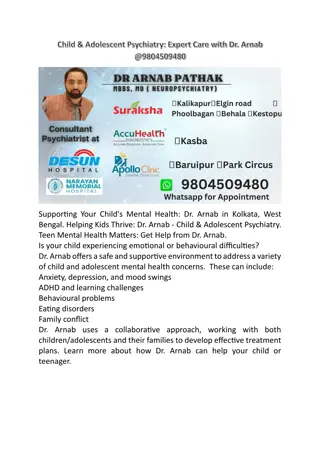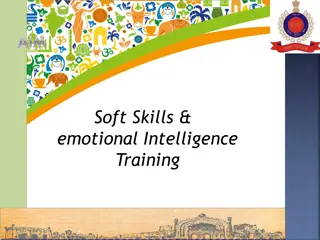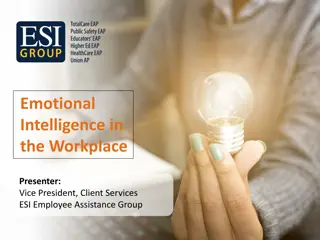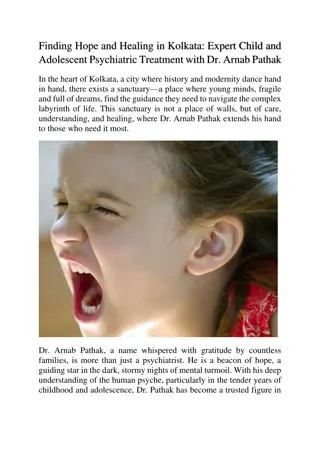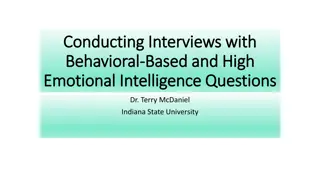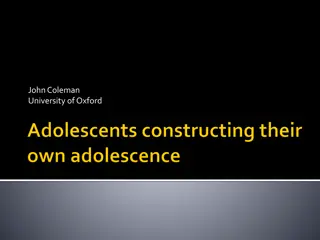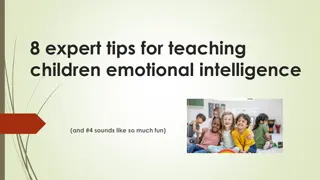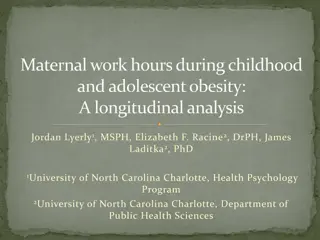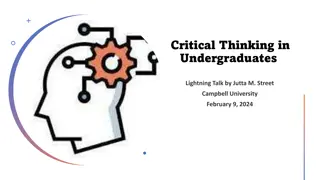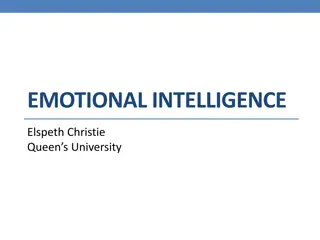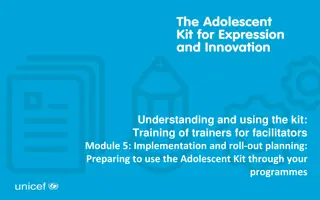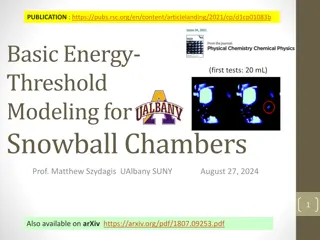Understanding Adolescent Development and Emotional Intelligence by Finbar Chambers
This collection presents insights on Gardner's Multiple Intelligences, Emotional Intelligence, and the importance of understanding adolescent development. Finbar Chambers explores emotional makeup, behavior management strategies, and the transition to independence during adolescence. Discover the impact of emotional reactions, amygdala hijacks, and cultural influences on teen behavior. Gain a deeper understanding of managing emotions, making decisions, and fostering self-awareness for effective communication and behavior regulation.
- Adolescent Development
- Emotional Intelligence
- Gardners Multiple Intelligences
- Behavior Management
- Self-Awareness
Download Presentation

Please find below an Image/Link to download the presentation.
The content on the website is provided AS IS for your information and personal use only. It may not be sold, licensed, or shared on other websites without obtaining consent from the author. Download presentation by click this link. If you encounter any issues during the download, it is possible that the publisher has removed the file from their server.
E N D
Presentation Transcript
PARENTS TALK ST AILBES NOV 20th2018 Fin Chambers fnchambers@Hotmail.com
FIN CHAMBERS 2017 10/1/2024 2
Gardners Multiple Intelligences Visual/Spatial architects Verbal/Linguistic writer Logical/Mathematical scientist Bodily/Kinesthetic sports Musical/Rhythmic musician Interpersonal verbal/non verbal communication Intrapersonal self awareness Natural biologist 10/1/2024 Finbar Chambers 2017 3
EMOTIONAL INTELLIGENCE DEFINITION Emotional intelligence is the ability to understand one s emotional make-up and the emotional make-up of others and to use insight from this knowledge to effectively manage and regulate one s own emotions to make good decisions and to act effectively Finbar Chambers 2017 10/1/2024 4
EMOTIONAL INTELLIGENCE Educating the heart Why do we get angry so fast Can we manage emotional reactions Why is it so hard sometimes to keep them under control What happens to us when we get too emotional Stress reactions IQ v EQ
Amygdala Hijack Like any skilled air traffic controller, the thalamus can quickly react to potential threat. In that case, it bypasses the neo cortex -- the thinking brain -- and the signal goes straight to the amygdala. The amygdala can only react based on previously stored patterns./Fight or flight/privileged position/anger or anxiety thalamu s --- Joshua Freedman Finbar Chambers 2017 10/1/2024 6
WHY DO WE NEED TO UNDERSTAND ADOLESCENT DEVELOPMENT Proper behavior management or discipline strategies Avoid misinterpretation of the teen s actions Understand which behaviors are culturally-based Recognize what is not typical FIN CHAMBERS 2017 10/1/2024 7
WHAT IS ADOLESCENCE? The stage in life between childhood and adulthood. A movement from dependency to independence. Move from part of family to wider peer group. Multi dimensional and gradual. These typical required changes differ from culture to culture. FIN CHAMBERS 2017 10/1/2024 8
WHAT IS ADOLESCENCE? Development should be viewed in relation to challenges in the following areas Biological Cognitive Psychological Social Moral FIN CHAMBERS 2017 10/1/2024 9
WHAT IS ADOLESCENCE? Some teens develop quicker than others. When the youth struggles with the developmental challenge they may suffer in the following areas. Physiological Emotional Behavioural FIN CHAMBERS 2017 10/1/2024 10
THE TEENAGE YEARS Trying to understand how they relate to the world A teenager's development can be divided into three stages -- early, middle, and late adolescence. Growth during adolescence is greater than at any other period of life after birth. Each is distinct and unique in his or her own way so processes vary from teenager to teenager FIN CHAMBERS 2017 10/1/2024 11
Early Adolescence 12-14 yrs Movement Toward Independence Struggle with sense of identity/peer groups vital Moodiness Improved abilities to use speech to express oneself More likely to express feelings by action than by words Close friendships gain importance Realization that parents are not perfect; identification of their faults FIN CHAMBERS 2017 10/1/2024 12
Middle Adolescence 15-16 yrs Movement Toward Independence Self-involvement, alternating between unrealistically high expectations and poor self- concept. Complaints that parents interfere with independence/search for privacy Extremely concerned with appearance and with one's own body /confusion FIN CHAMBERS 2017 10/1/2024 13
Biological Changes Puberty Can be an issue if this is too early or late May experience an uncomfortable level of stress as a result. Consequences can effect self esteem and confidence in self. NB The biological changes can trigger physiological, sexual and emotional changes. FIN CHAMBERS 2017 10/1/2024 14
SEXUAL CHANGES Puberty triggers production of sexual hormones. Increase in desire and sexual urges a move towards friendships away from family [part of dependent to independent movement] Can cause difficulty and confusion. In particular in early adolescence. By late adolescence many young people are seen to be psychologically ready for an active sex life FIN CHAMBERS 2017 10/1/2024 15
COGNITIVE CHANGES egocentrism /everyone s watching me Early childhood - limited ability to take perspectives of others Adolescence - unrefined imagining the perspectives of others on overdrive FIN CHAMBERS 2017 10/1/2024 16
EGOCENTRIC THINKING Feelings of uniqueness/u don t understand me/ vulnerability, omnipotence/risk taking/nothing bad can happen/live forever [all part of the journey for individuality] FIN CHAMBERS 2017 10/1/2024 17
IDENTITY Young people due to the many stresses at this time find it tough to tolerate change. [Shave and Shave 1989] Therefore the adolescent can respond very emotionally to what might seem quite trivial to an adult. [mood swings/anger/depression] Shame can be a big factor and young people can feel embarrassed, humiliated, ashamed, and is therefore understandable that they develop so many defense mechanisms. [denial/projection, regression etc] FIN CHAMBERS 2017 10/1/2024 18
PARENTAL EXPECTATIONS Rutter [1995] saw parental expectations/lack of expectations as being a big problem for adolescents. Steinberg [1990] saw the combination of adolescent phase of development and the high emotional changes caused great distress in many parents. FIN CHAMBERS 2017 10/1/2024 19
PARENTAL EXPECTATIONS Typical parental reactions can be decline in the marital relationship, increased awareness of getting old, inability to leave the teen differentiate, distress at the disintegration of previous authority. Causes many parents to withdraw and disengage at a time when support is needed most. FIN CHAMBERS 2017 10/1/2024 20


